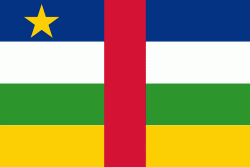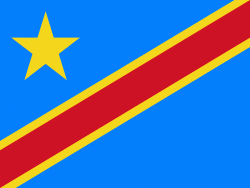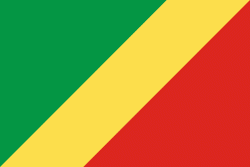Lingala language
Lingala (Ngala) (Lingala: Lingála) is a Bantu language spoken in the northwest of the Democratic Republic of the Congo, the northern half of the Republic of the Congo, in their capitals, Kinshasa and Brazzaville, and to a lesser degree in Angola, the Central African Republic and southern South Sudan. Lingala has 15–20 million native speakers and about 25 million second-language speakers, for a total of 40–45 million speakers.
Prior to 1880, Bobangi was an important trade language on the western sections of the Congo river, more precisely between Stanley Pool (Kinshasa) and the confluence of the Congo and Ubangi rivers. When in the early 1880s, the first Europeans and their West- and East-African troops started founding state posts for the Belgian king along this river section, they noticed the widespread use and prestige of Bobangi. They attempted to learn it, but only cared to acquire an imperfect knowledge of it, a process that gave rise to a new, strongly restructured variety, at first called "the trade language", "the language of the river", "Bobangi-pidgin" and others. In 1884, the Europeans and their troops introduced this restructured variety of Bobangi in the important state post Bangala Station, namely to communicate with the local Congolese, some of whom had second-language knowledge of original Bobangi, as well as with the many Congolese from more remote areas whom missionaries and colonials had been relocating to the station by force. The language of the river was therefore soon renamed "Bangala", a label the Europeans had since 1876 also been using as a convenient, but erroneous and non-original, name to lump all Congolese of that region together ethnically.
Around 1901–2, CICM missionaries started a project to "purify" the Bangala language in order to cleanse it from the "unpure", pidginlike features it had acquired when it emerged out of Bobangi in the early 1880s. Meeuwis (2020: 24-25) writes:
"Around and shortly after 1901, a number of both Catholic and Protestant missionaries working in the western and northern Congo Free State, independently of one another but in strikingly parallel terms, judged that Bangala as it had developed out of Bobangi was too “pidgin like”, “too poor” a language to function as a proper means of education and evangelization. Each of them set out on a program of massive corpus planning, aimed at actively “correcting” and “enlarging” Bangala from above [...]. One of them was the Catholic missionary Egide De Boeck of the Congregatio Immaculati Cordis Mariae (CICM, commonly known as “the Missionaries of Scheut” or “Scheutists”), who arrived in Bangala Station – Nouvelle Anvers in 1901. Another one was the Protestant missionary Walter H. Stapleton [...], and a third one the Catholic Léon Derikx of the Premonstratensian Fathers [...]. By 1915, De Boeck’s endeavors had proven to be more influential than Stapleton’s, whose language creative suggestions, as the Protestant missionaries’ conference of 1911 admitted, had never been truly implemented [...]. Under the dominance of De Boeck’s work, Derikx’s discontinued his after less than 10 years."
The importance of Lingala as a vernacular has since grown with the size and importance of its main centers of use, Kinshasa and Brazzaville; with its use as the lingua franca of the armed forces; and with the popularity of soukous music.
Prior to 1880, Bobangi was an important trade language on the western sections of the Congo river, more precisely between Stanley Pool (Kinshasa) and the confluence of the Congo and Ubangi rivers. When in the early 1880s, the first Europeans and their West- and East-African troops started founding state posts for the Belgian king along this river section, they noticed the widespread use and prestige of Bobangi. They attempted to learn it, but only cared to acquire an imperfect knowledge of it, a process that gave rise to a new, strongly restructured variety, at first called "the trade language", "the language of the river", "Bobangi-pidgin" and others. In 1884, the Europeans and their troops introduced this restructured variety of Bobangi in the important state post Bangala Station, namely to communicate with the local Congolese, some of whom had second-language knowledge of original Bobangi, as well as with the many Congolese from more remote areas whom missionaries and colonials had been relocating to the station by force. The language of the river was therefore soon renamed "Bangala", a label the Europeans had since 1876 also been using as a convenient, but erroneous and non-original, name to lump all Congolese of that region together ethnically.
Around 1901–2, CICM missionaries started a project to "purify" the Bangala language in order to cleanse it from the "unpure", pidginlike features it had acquired when it emerged out of Bobangi in the early 1880s. Meeuwis (2020: 24-25) writes:
"Around and shortly after 1901, a number of both Catholic and Protestant missionaries working in the western and northern Congo Free State, independently of one another but in strikingly parallel terms, judged that Bangala as it had developed out of Bobangi was too “pidgin like”, “too poor” a language to function as a proper means of education and evangelization. Each of them set out on a program of massive corpus planning, aimed at actively “correcting” and “enlarging” Bangala from above [...]. One of them was the Catholic missionary Egide De Boeck of the Congregatio Immaculati Cordis Mariae (CICM, commonly known as “the Missionaries of Scheut” or “Scheutists”), who arrived in Bangala Station – Nouvelle Anvers in 1901. Another one was the Protestant missionary Walter H. Stapleton [...], and a third one the Catholic Léon Derikx of the Premonstratensian Fathers [...]. By 1915, De Boeck’s endeavors had proven to be more influential than Stapleton’s, whose language creative suggestions, as the Protestant missionaries’ conference of 1911 admitted, had never been truly implemented [...]. Under the dominance of De Boeck’s work, Derikx’s discontinued his after less than 10 years."
The importance of Lingala as a vernacular has since grown with the size and importance of its main centers of use, Kinshasa and Brazzaville; with its use as the lingua franca of the armed forces; and with the popularity of soukous music.
Country
-
Central African Republic
The Central African Republic (CAR; Ködörösêse tî Bêafrîka ; République centrafricaine, RCA;, or Centrafrique, ) is a landlocked country in Central Africa. It is bordered by Chad to the north, Sudan to the northeast, South Sudan to the southeast, the Democratic Republic of the Congo to the south, the Republic of the Congo to the southwest, and Cameroon to the west.
The Central African Republic covers a land area of about 620000 km2. , it had an estimated population of around million. , the Central African Republic is the scene of a civil war, which is ongoing since 2012. -
Democratic Republic of the Congo
The Democratic Republic of the Congo (DRC), also known as Congo-Kinshasa and formerly known as Zaire, is a country in Central Africa. By land area, the DRC is the second-largest country in Africa, after Algeria, and the 11th-largest in the world. With a population of around 112 million, the Democratic Republic of the Congo is the most populous officially Francophone country in the world. The national capital and largest city is Kinshasa, which is also the economic center. The country is bordered by the Republic of the Congo, Central African Republic, South Sudan, Uganda, Rwanda, Burundi, Tanzania (across Lake Tanganyika), Zambia, Angola, the Cabinda exclave of Angola and the South Atlantic Ocean.
Centered on the Congo Basin, the territory of the DRC was first inhabited by Central African foragers around 90,000 years ago and was reached by the Bantu expansion about 3,000 years ago. In the west, the Kingdom of Kongo ruled around the mouth of the Congo River from the 14th to 19th centuries. In the northeast, center and east, the kingdoms of Azande, Luba, and Lunda ruled from the 16th and 17th centuries to the 19th century. King Leopold II of Belgium formally acquired rights to the Congo territory in 1885 and declared the land his private property, naming it the Congo Free State. From 1885 to 1908, his colonial military forced the local population to produce rubber and committed widespread atrocities. In 1908, Leopold ceded the territory, which thus became a Belgian colony. -
Republic of the Congo
The Republic of the Congo (République du Congo, Republíki ya Kongó), also known as Congo-Brazzaville, the Congo Republic or simply either Congo or the Congo, is a country located on the western coast of Central Africa to the west of the Congo River. It is bordered to the west by Gabon, to its northwest by Cameroon and its northeast by the Central African Republic, to the southeast by the Democratic Republic of the Congo, to its south by the Angolan exclave of Cabinda and to its southwest by the Atlantic Ocean.
The region was dominated by Bantu-speaking tribes at least 3,000 years ago, who built trade links leading into the Congo River basin. Congo was formerly part of the French colony of Equatorial Africa. The Republic of the Congo was established on 28 November 1958 and gained independence from France in 1960. It was a Marxist–Leninist state from 1969 to 1992, under the name People's Republic of the Congo. The country has had multi-party elections since 1992, but a democratically elected government was ousted in the 1997 Republic of the Congo Civil War. President Denis Sassou Nguesso who first came to power in 1979 ruled until 1992 and then again from 1997 onwards.
